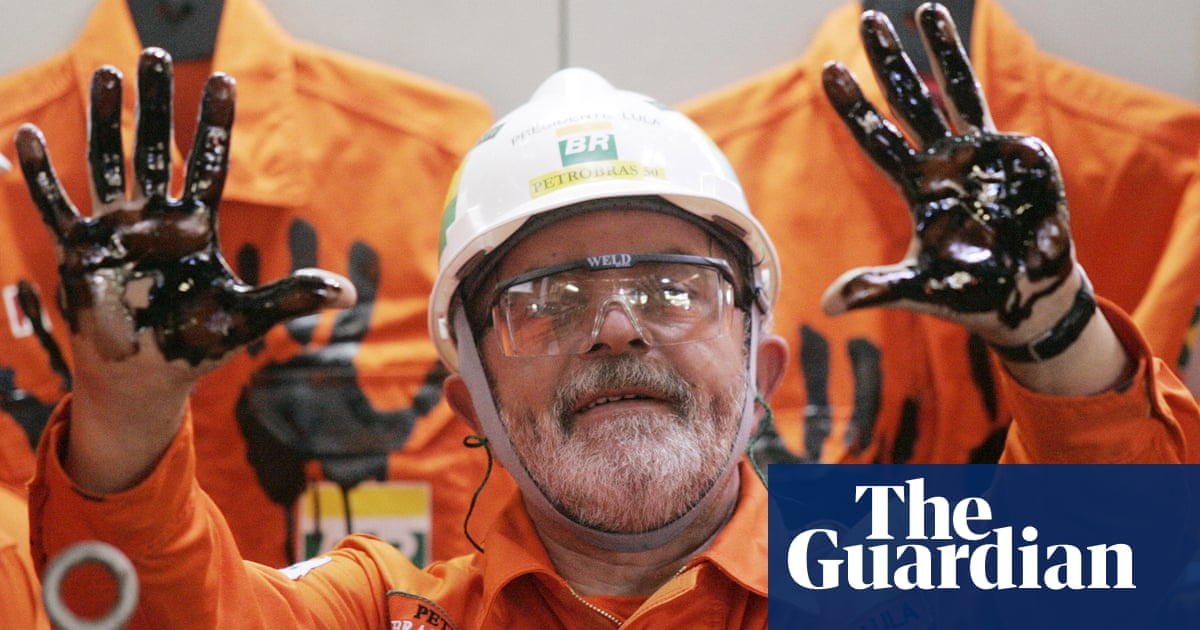About half the countries in the region are experiencing a rush in oil exploration that threatens the global drive to achieve net zero. But many argue that they have a right to enrich themselves in the same way the west has
His raised hands dirty with oil, the president of Brazil, Luiz Inácio Lula da Silva – then in his first term – stood in front of the cameras with a broad smile on his face during the inauguration of Platform P50, located in Campos, Rio de Janeiro. Petrobras, a state-controlled national company, had discovered immense oil and gas deposits in the Atlantic Ocean’s depths.
“Today we are celebrating another independence,” said Lula. “We are witnessing a milestone that will mark a new era to Brazil’s development.”
That was 21 April 2006. Eighteen years later, amid fears for the impact on the climate crisis, a new oil rush is underway in Latin America and the Caribbean as the region is heading for a boom in exports of “black gold”.
At least 16 of the 33 Latin American and Caribbean countries are involved in about 50 major new oil and gas onshore and offshore projects.
Two new powerhouses, Brazil and Guyana, are expected to register two of the three largest increases in fossil fuel exports by 2035.
Two new powerhouses, Brazil and Guyana, are expected to register two of the three largest increases in fossil fuel exports by 2035.
Well, at least Brazil won’t. At not in net exports (but it can export more and them import all of it). It’s a lie.
Fuck them all. Selfish cunts going after a quick buck despite knowing what it’s doing to the world.
Would you support a policy that would see western nations paying developing nations to leave fossil fuel reserves untouched, proportional to the value of the fossil fuel reserves?
That’s the only thing that could make this fair, don’t you think?
Fuck them all rich countries. They got dirty rich exploring the global south and now want them to be condemned to be eternally poor.
We all share the same planet. This is shortsighted and self-defeating.
People got rich off of slavery, do you think others should be allowed to do that as well? Because it’s not fair to stop it when others didn’t benefit yet.
when the rich countries start paying to fix the problem, the the poor countries will stop trying to improve their situation and help.
The north always says “do your part, we are all in this together” when asking to keep the status quo, but they have never accepted any treaty that makes them suffer the consequences of their actions (or are you gonna tell me that the south fucked up the world?)
this is proposed every chance possible and is never accepted.
The global south can be 100% commited to ending climate change and nothing would happen. If the north doesn’t take their oily, coaly money and do the heaby lifting, nothing will change. The task of saving the world is impossible.
so as long as the north is short soghted and petty, the only reasonable action for the south is the same. sacrificing their short term well being just buys a little more time for the north to polute us to death
We all share the same planet.
Maybe it’s time to share everything else. Why should we need to live in poverty while folks up north are living large?
Fine, but you need to facilitate the acquisition of green tech on the part of poor countries to at least partially replace fossil capacity, like waiving patents (not gonna happen, look at COVID vaccines), relocating production there (muh jerbs), subsidies (no, lol)…?
Like arguing you had right of way from six feet under.
It’s reasonable to pay other countries for the damage already done to our collective world and to share around the wealth gained.
Of course rich countries aren’t doing that so here we are.
Oil dissolved his finger!
That’s 9!
Give me 4 man!
This is the best summary I could come up with:
His raised hands dirty with oil, the president of Brazil, Luiz Inácio Lula da Silva – then in his first term – stood in front of the cameras with a broad smile on his face during the inauguration of Platform P50, located in Campos, Rio de Janeiro.
According to the latest report from the International Energy Agency (IEA), production in Latin America and the Caribbean, which stood at 8m barrels a day (mb/d) in 2022, will continue to grow above demand, adding 2 mb/d destined for export by 2030.
Meanwhile, Suriname has become a “rising star” in the oil market with some big offshore discoveries, including new deposits in Block 58 by TotalEnergies and APA, estimated at 700m barrels, with the potential to transform the economy of South America’s smallest nation.
Marcelo Mena, Chile’s former environment minister and the former director of the Climate Action Center at Pontificia Universidad Católica de Valparaíso (PUCV), says that the strategy of investing in oil is a mistake.
Thomas Singh, a lecturer in the Department of Economics at the University of Guyana, acknowledges that “the oil discovery has happened at a wrong time in our history … when there is serious discussion about global climate change and the need for decarbonisation”.
According to Carlos Nobre, a Brazilian scientist, meteorologist, and member of the UK’s Royal Society who warned the world about the risk of a tipping point and the “savannisation of the Amazon”, investing money and technology in oil prospecting and exploration today could be a decisive mistake for humanity’s future.
The original article contains 1,625 words, the summary contains 257 words. Saved 84%. I’m a bot and I’m open source!







